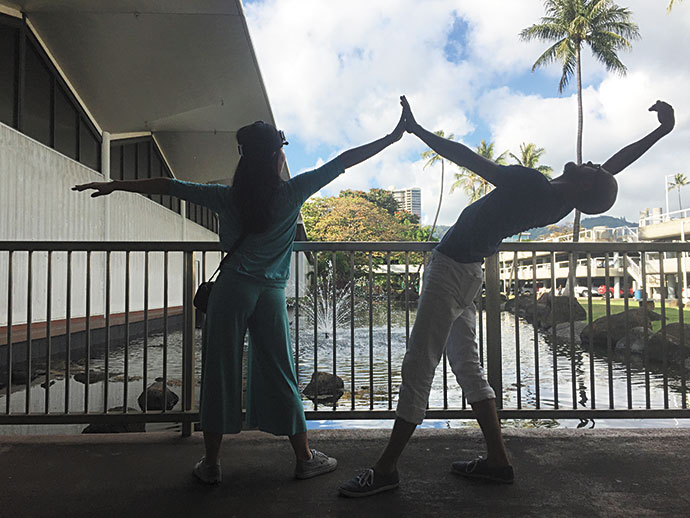Glamborous
A ‘FLOOD’ THROUGH TOWN
As part of Kakaako Agora’s June Kaboom summer festival of free programs, SheenRu Yong and Spacial Sculptors put on a community choreographic project, FLOOD, that addressed the issues of water ownership through movement. It started with a meet-up at the ponds outside of the Blaisdell, passed through the area between the convention center and arena, and then headed down to the ocean, metaphorically becoming water heading to the ocean. The dancers were wearing blue outfits, and the movement was slow and gentle, with softness akin to Tai Chi.
Unfortunately, the security guards at Blaisdell weren’t inspired by the movement and told the dancers that they would have to stop what they were doing. I asked one of the guards to describe what he thought it was that the group was doing and why it wasn’t allowed, to which he said, “I’m not sure, but they can’t do it here.”
There were several groups dancing in the same public area, warming up for the 41st annual King Kamehameha Hula Competition. It made me think of hula’s history and how hula was banned because it was considered a pagan ritual by the newly converted Christian court. It seems ironic that modern dance that was depicting a storyline of the flow and diversion of Hawaii’s natural resources was banned from the grounds of the competition, but it’s not that surprising. Even though the movement was non-threatening, controlled and taking place at a completely safe distance from the event, the fact that the movement was different than normal walking or the familiar hula created fear.
It is nothing new for forms of movement to be banned. Skateboarding and rollerblading often are considered to be public disturbances, while some cities are beginning to embrace the sports as healthy recreational activities and intentionally design public urban plazas with these sports in mind. Tai Chi was banned from a New Zealand Christian church for being “un-Christian,” and Falun Gong has been persecuted in China for decades.
I was glad to see that the dancers kept moving through the incident, and although they did comply with the Blais-dell staff’s request to leave the premises, the dancers seemed unfazed by the id-iocracy of the situation. They definitely made an impact through the dance and got people thinking about different ways of moving through space.
Despite the almost silly interruption, I found it was inspiring to see people getting out into the community and pushing boundaries by bringing new forms of art into public space.
facebook.com/antonglambmusic


